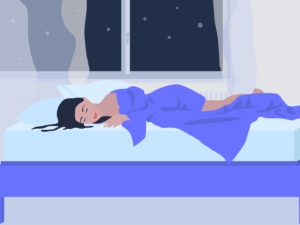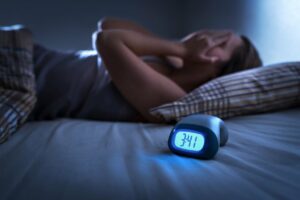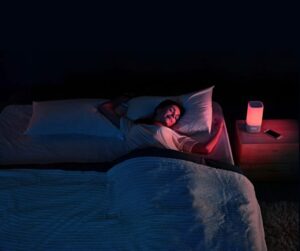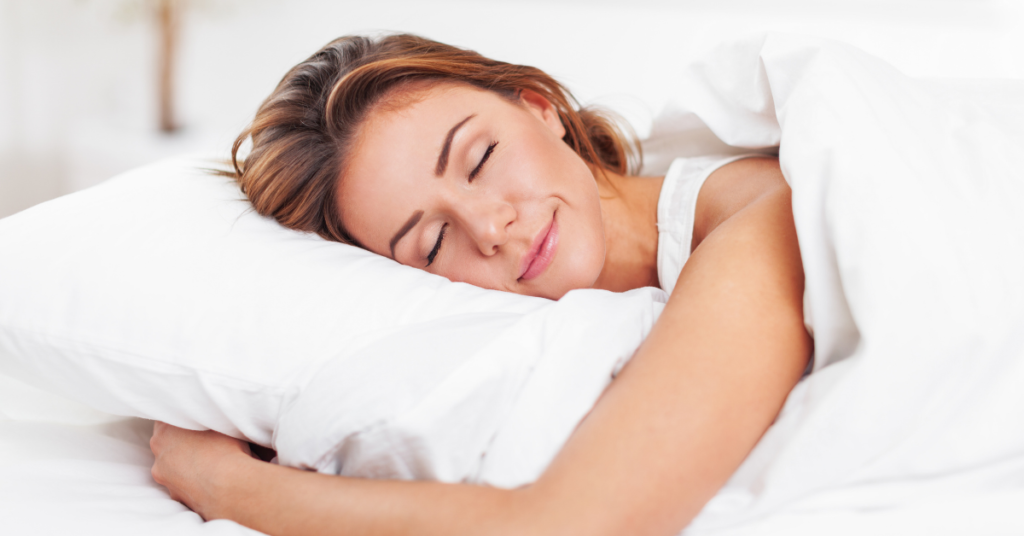Sleep is one of the most important things to do for your health. Getting a good night’s sleep is one of the most important things for your health. It improves your mood, makes you more productive during the day, and helps you stay healthy. There are many ways that you can improve your sleep quality.
Contents
- 1 How to Sleep Better?
- 1.1 Create a Bedtime Ritual
- 1.2 Try Not To Go To Bed Until You Feel Sleepy
- 1.3 Sleep in a Cool Room
- 1.4 Try not to Take Naps During The Day
- 1.5 Don’t Lie in Bed Wondering
- 1.6 Expose Yourself to Bright Light
- 1.7 Exercise Every Day
- 1.8 Avoid Caffeine and Alcohol
- 1.9 Stick to a Consistent Sleep Schedule
- 1.10 Don’t Drink too Much Water Before Sleep
- 1.11 Don’t Eat within Three Hours of Bedtime
- 1.12 Create a Sleeping Space
- 1.13 Eliminate Distractions
- 1.14 Get a Good Quality Mattress and Pillow
- 1.15 Try to Sleep in a Dark Room
- 1.16 Use “Sleep Hygiene” as the Last Resort
- 1.17 Avoid Eating Big Meals at Night
- 1.18 Create a List of Potential Reasons
- 1.19 Try Writing Down Your Worries
- 1.20 Don’t Stress
- 1.21 Avoid Eating Sugary Snacks
- 1.22 Try Eating Bananas
- 1.23 Get Some Aromatherapy Candles
- 1.24 Try Reading a Book
- 1.25 Be Grateful
- 1.26 Try Yoga or Meditation
- 1.27 Experiment with Different Positions
- 1.28 Avoid Working at Night
- 1.29 Do Exercise at Right Time
- 2 A Word From Mantra Care
How to Sleep Better?

Everyone has trouble sleeping at times. It can be due to stress, work, family, or just because they lie in bed with their thoughts all night long. If you’re one of those people struggling to sleep, then you know how it can affect your job performance, relationships, and overall well-being.
If you need help sleeping better, there are some things you can keep in mind. These points are:
Create a Bedtime Ritual
Your body gets used to certain cues that let it know that it’s time to wind down and prepare for sleep. For example, you might change into your pajamas, brush your teeth, and read a book before going to sleep at night. This signals your brain that it’s time for bed and can help you relax and fall asleep faster.
Try Not To Go To Bed Until You Feel Sleepy
If you try to force yourself to sleep, it’s going to be a battle between your will and your body calling for rest. Your brain starts racing when this happens, which will make it even harder to sleep. If you don’t feel tired yet but need some extra time at night, there are other things you can do while in bed besides trying hard to fall asleep. Just remember that the more time you spend in bed awake, the less likely you’ll be able to doze off next time.
Sleep in a Cool Room

Your body temperature naturally lowers as you sleep, so using your thermostat to adjust the room’s temperature can help make falling asleep easier. You’ll also feel more comfortable if the air around you is cool. Make sure that there are no fans or open windows nearby though because these can cause unwanted drafts and make it difficult for your body to lower its temperature.
Try not to Take Naps During The Day
When you take a nap during the day, it may seem like you’re giving yourself the extra time that you can use to sleep at night. However, taking a nap can cause your nighttime sleep to be worse since it messes with your circadian rhythms (the internal clock that determines when you feel sleepy and when you feel awake.
Don’t Lie in Bed Wondering

If you wake up in the middle of the night, telling yourself that you need to go back to sleep right away can be a mistake. When your alarm goes off in the morning, your brain knows that you woke up earlier but went back to sleep. If you lie awake at night worrying about falling asleep, then your brain will think that you’re still awake and alert all night long. Try meditating or practicing relaxing breathing techniques if this happens frequently to you.
Expose Yourself to Bright Light
Exposing yourself to bright light after waking up can help to regulate your body’s natural circadian rhythms. Try going outside on a nice day or sitting by a sunny window for some extra exposure if possible.
Exercise Every Day
Daily exercise is one of the best things you can do to improve your sleep quality since it helps you feel more relaxed and less stressed throughout the day. In addition, working out can have a positive effect on your mind as well as your body. If you’re not an early morning person, then try going for a walk during lunch or doing some yoga or Pilates at night instead of first thing in the morning.
Avoid Caffeine and Alcohol

Caffeine is a stimulant that causes your body to think that it’s awake when you drink caffeine, even if you’ve been up for many hours. It takes four to six hours to clear caffeine from your system, so drinking coffee in the afternoon can make it hard for you to fall asleep in the evening. If you absolutely need a cup of coffee before bed, then try having just one or two cups instead of multiple servings throughout the day. You could also switch to decaf or drink tea instead since these don’t contain any caffeine.
Alcohol causes the opposite problem since it acts as a relaxant and can help you feel drowsy initially. However, alcohol is also a central nervous system depressant so it makes falling and staying asleep much harder than if you had consumed no alcohol at all. If you do drink before bed, then try to stick to only one or two drinks instead of having several. You should also make sure that you don’t drink too much throughout the entire day since this can cause severe sleep problems as well.
Stick to a Consistent Sleep Schedule
Doing your best to keep your sleeping habits consistent can help you fall asleep faster and stay asleep for longer every night. Try getting up at the same time every morning regardless of whether or not you went to sleep early or stayed up late the night before. Fixing your bedtime hours ahead of time is another good way to ensure that you get enough restful nights so try setting aside eight hours for sleep every night. If you need to, schedule a bedtime alarm or even use the snooze function on your phone as a reminder of when it’s time to go to bed.
Don’t Drink too Much Water Before Sleep

Drinking a lot of water close to bedtime can make you wake up in the middle of the night because you have to pee so badly which can disrupt your sleep cycle if it happens frequently. The same goes for exercising close to bedtime since being physically active will raise your body temperature and also tire out your muscles so that they require more rest. If you’re thirsty, then drink a little bit of water instead since it’s important to stay hydrated throughout the day.
Don’t Eat within Three Hours of Bedtime
Eating before bed can keep you awake since your body is busy digesting food instead of relaxing and preparing to drift off into a deep slumber. Experiment with going without food throughout the entire evening or have a small snack if need be but stick with light foods that won’t cause digestive problems such as whole-grain crackers, low-sugar cereals, milk, yogurt, and honey.
Create a Sleeping Space
In order to get quality sleep every night, it’s important that you create an environment that puts your mind and body at ease so they can naturally unwind from the stresses of the day. Try burning an aromatic candle before bed or drinking a cup of chamomile tea to help you relax and get ready for sleep. You should also make sure that your room is dark, cool, and comfortable since this will help you feel more at ease and encourage a restful night.
Eliminate Distractions

These devices can really interfere with your sleep quality because they emit bright light that tricks your body into staying awake when it’s supposed to be winding down in preparation for slumber. If possible, try moving them out of the bedroom altogether so you’re not tempted to use them when you’re trying to snooze. Use plugs or eyeshades if they’re still in the room with you so that their light doesn’t keep you from nodding off into dreamland.
Get a Good Quality Mattress and Pillow
In order to get a better night’s sleep, it’s important that your body is supported by a comfortable bed and pillow so you don’t feel any discomfort when trying to nod off or stay asleep during slumber time. You might even want to consider upgrading your mattress or pillows since this could be a major cause of insomnia if you have an uncomfortable bed at home. A memory foam mattress will fit most people’s budgets without breaking the bank while under-the-bed storage containers can add extra storage space for bedroom essentials such as extra pillows and sheets when not in use.
Try to Sleep in a Dark Room

In order to get quality sleep at night, it’s important that you make sure your bedroom is completely dark while you’re trying to fall asleep since bright lights can interfere with melatonin production and can cause your internal clock to get out whack. Use blackout curtains or shades if necessary and cover any light sources such as alarm clocks so you won’t be awoken by a bright glow in the middle of the night.
Use “Sleep Hygiene” as the Last Resort
In some cases, people may need additional help falling asleep at night due to mental or emotional issues related to anxiety or other mood disorders that are preventing them from slipping into slumberland. If you feel like you may need additional help with this, try using “sleep hygiene” which entails changing certain behaviors so your body isn’t getting confused about when it’s supposed to nod off. For example, avoid drinking alcohol within a few hours of bedtime so you don’t disrupt the natural sleep cycle and instead opt for herbal tea or warm milk which have been shown to promote better sleep in some people during nighttime hours.
Avoid Eating Big Meals at Night
When you’re trying to sleep at night it’s important that you don’t go to bed feeling extremely hungry since this could keep you up for hours upon hours as your body digests food and sends signals to your brain about when it needs to enter into rest mode. Avoid eating large meals within two hours before bedtime and opt for lighter snacks like crackers and cheese instead since these will provide some energy but won’t be as difficult for your body to break down and digest quickly.
Create a List of Potential Reasons
In order to pinpoint the exact reason that you’re having trouble falling asleep at night, it can be helpful to create a comprehensive list of factors including everything from sleeping habits and stress factors related to work or relationships so you have a complete overview of what’s causing problems with your sleep quality. If this doesn’t help enough, try jotting down your thoughts after each day so you can look back on them in case there are any patterns developing that could offer further insight into why you’re not getting restful sleep as you should be.
Try Writing Down Your Worries

In some cases, people may be lying in bed at night but can’t sleep because they have a litany of worries on the brain that are keeping them from focusing on anything else. To help with this problem, try writing down all of your concerns and then putting them aside for a while until you’re starting to feel sleepy so you aren’t distracted by these thoughts any longer.
Don’t Stress
When you’re trying to fall asleep one of the most common mistakes is worrying about whether or not you’ll fall asleep soon enough since there’s nothing worse than being unable to nod off when you want to. However, if you beat yourself up over this, you’ll only create more anxiety and frustration which is the last thing you need as a pre-existing condition that can really put a damper on your overall wellbeing. In addition to this, don’t worry about sleeping too much either since there’s nothing worse than waking up in the middle of the night and staying awake for hours at a time. Just relax and let things happen naturally without forcing them or trying to control every aspect of your life with strict rules that aren’t necessary.
Avoid Eating Sugary Snacks

In order to get quality sleep at night, it’s important that you make sure you avoid eating sugary snacks like candy bars or desserts shortly before going to bed since these foods will cause spikes in your blood sugar levels which could wake you up later on after they have been digested. Instead, opt for healthier snacks like dried fruit or crackers and cheese since these won’t cause your body any problems and will actually help improve the quality of your sleep.
Try Eating Bananas
One of the easiest ways to get a better night’s rest is by adding some foods to your diet that have been known to help induce sleep since bananas are not only delicious but also contain magnesium which has been shown in medical studies to help with relaxation and stress relief. If you don’t like bananas, try almonds, yogurt, chicken or turkey meat, and whole-grain brown rice instead since these all have similar benefits for your body and mind without having too many adverse side effects.
Get Some Aromatherapy Candles

If incense isn’t your thing, another great way to induce better sleep is by getting yourself some relaxing scented candles that will emit calming fragrances throughout the room in order to help guide you towards falling asleep faster and staying in deeper states of relaxation longer than usual. Just make sure they are scented candles and not scented incense if you want them to act as an aid for sleeping rather than a distraction.
Try Reading a Book
Whenever you’re thinking about things before bedtime, the best thing to do is give your brain a break and try reading something calming like a book or even an article online instead. If neither of these options works for you, however, another idea would be to get out of bed and start doing some simple stretches or yoga poses in order to help relax your tense muscles and get rid of any tension in your body that might be keeping you awake even after turning off all other lights in the room.
Be Grateful

If you have a hard time falling asleep at night, try making a gratitude list for all the things you’re happy about in your life today so that your brain doesn’t have a chance to think about what could go wrong later on as it tends to do whenever negative thoughts start taking over. If this still isn’t enough to help you out, just quickly jot down whatever’s worrying you before sleep and resolve them tomorrow once they’ve been resolved since having no worries will definitely help you fall asleep faster than normal without any issue whatsoever.
Try Yoga or Meditation
If you do yoga or meditation in the morning, try meditating right before bed if you can. It will help your body and mind relax into sleep more easily than usual whenever possible.
Experiment with Different Positions
If you’re still having problems falling asleep at night, try out some new bedtime routines or even switch up your position in bed if it’s been working for you until now. Whatever you do, don’t keep doing the same thing every day of the week if it doesn’t seem to be helping as much as usual because sometimes change is the only way to really get things moving again whenever possible.
Avoid Working at Night

Work can be a nightmare for many people, but it’s especially harmful if you have trouble sleeping at night because it’ll make it that much harder to go to sleep at a reasonable time. Try not to work at all before going to sleep if you want a restful night’s sleep. If you can, do something relaxing like reading a book or watching TV instead of working on important things that need your focus.
Do Exercise at Right Time
Be sure to exercise daily, preferably in the afternoon or evening hours. If you must do a quick workout before bedtime then make sure it’s something relaxing like meditation and not intense lifting sessions that could harm both your wellbeing as well as our environment by stressing out all those around us who also need their rest with what little daylight they have left.
A Word From Mantra Care
People need to learn about the science behind sleep and how it can improve their life. Sleep is important for many aspects of our health, such as mental acuity and muscle growth. Knowing more about these benefits will hopefully encourage you to make better decisions in your daily routine so that you too can get a good night’s rest. Luckily, there are some things that you can do in order to get the rest your body wants and needs.
For more information, please contact MantraCare. Sleep is an essential part of our daily routine and it plays a significant role in maintaining a healthy body and mind. If you have any queries regarding Online Insomnia Counseling experienced therapists at MantraCare can help: Book a trial therapy session



Comments are closed.